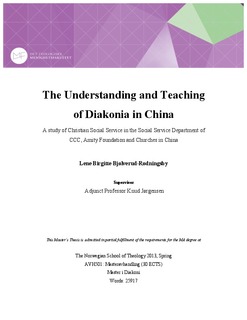The understanding and teaching of diakonia in China : a study of Christian social service in the Social Service Department of CCC, Amity Foundation and Churches in China
Master thesis
Permanent lenke
http://hdl.handle.net/11250/161389Utgivelsesdato
2013-07-09Metadata
Vis full innførselSamlinger
Sammendrag
My research question is as follows:
How do diaconal agents at different levels in China understand the term diakonia
and its theological foundation, and how does this find expression in their self-
understanding, education and relationship with society?
Because of the lack of literature on the diaconal work in China, the basis for this study
are interviews with China experts, the management of the China Christian Council,
Amity Foundation, people that work within the provincial councils and churches in
China, diaconal students in Hong Kong and other key persons with knowledge of the
topic.
The Chinese word for diakonia is shè guān fú chi, witch means Society-
Care-Service. The word diakonia is a new concept in China and because of this, most of
my informants will find it difficult to relate to this term. Other informants are familiar
with the concept of diakonia, but thinks of it as a western concept more related to the
Lutheran church. I have therefore chosen to use the words Christian Social Service
instead of diakonia in my interviews and interview guides. Since the two organizations
have chosen have somewhat different approaches to their social service, I have chosen to
focus on their understanding of the term diakonia, self-understanding as diaconal agents
and to what extent training and education is given to nourish and inspire continuing
Christian social service.
